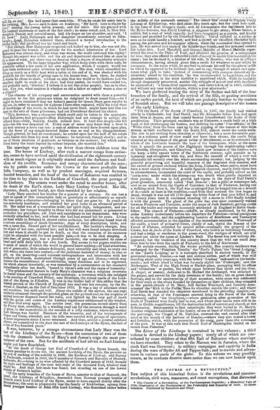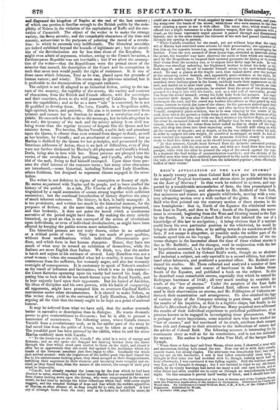' THE COURSE OF A REVOLUTION. * THE subject of this
historical hetion Is the revolutions and ceunter- revolutions, civil wars, massacres, and court corruptions, that distracted a The Course of a Revolution, or the Farthenopiests Republic,; a Historical Tale 1798, illustrative of the Tendencies of Use Fraternity and Equality of sass. in name volumes: Published by Saunders and °My% and disgraced the kingdom of Naples at the end of the last century; of which one portion is familiar enough to the British public by the com- plicity of Nelson in the violation of the capitulation of Ruffo and the exe- cution of Caraccioli. The object of the writer is to make the strange variety, the fierce atrocity, and the remarkable characters of the time and country, subservient to the purposes of pointing the moral of a revolu- tion: in which he succeeds very indifferently. The historical atrocities are indeed exhibited beyond the bounds of legitimate art ; but the atroci- ties of the Revolutionists are far less than those of the Royalists. It might even admit of argument, whether, owing to the French invasion, a Parthenopwan Republic was not inevitable ; but if we allow the assump- tion of the writer—that the Republicans were the primal cause of the miseries that ensued, his description of the Court and its corruptions is such that most men would justify the right of resistance. It is one of those cases which Johnson, Tory as he was, placed upon the grounds of human nature; and wisely. The storm may do grievous mischief, but it is preferable to the decomposition of stagnant rankness.
The subject is not ill adapted to an historical fiction, owing to the na- ture of the country, the rapidity of the events, the variety and contrast of characters, from the British and French officers, with the sovereigns and their courtiers, down to the wild peasantry of Calabria. The author sees the capabilities; and as far as a mere " tale " is concerned, he is not Ill qualified to develop them. The hero, Caraffa, is a Neapolitan noble, high-spirited, brave, and patriotic. His aim is to rescue his country from tyranny and restore her to freedom by means of a revolution and a re- public. He succeeds in both so far as the means go, but he fails altogether in his end; the tyranny of the mob and the misery arising from civil war being worse than the regular tyranny of despots like the Queen and her minister Acton. The heroine, Marina Vercelli, a noble lady and attendant npon the Queen, is oftener than once rescued from danger or death, as well as her brother, by Caraffa ; and an attachment of course ensues : but as Marina is disliked by the Queen for her principles, and persecuted by the licentious addresses of Acton, there is no lack of difficulties, even if they were not further thickened by Marina's old playmate and Caraffa's friend, Doria, being also in love with her. These persons are plunged into the vortex of the revolution ; Doria perishing, and Caraffa, after being the idol of the mob, living to find himself execrated. Upon these three per- sons the chief interest of the romance turns ; but malay other characters are introduced,—some historical, including Nelson and Lady Hamilton, Others fictitious, but designed to represent classes engaged in the revo- lution.
The writer is not deficient in vigour of conception or fluency of style. He seems acquainted with Naples and its people, and to have studied the history of the period. As a tale, The Course of a Revolution is dis- tinguished by a rapid succession of scenes strung together with sufficient connexion; but the continual introduction of history deprives the story of much inherent coherence. The history, in fact, is badly managed : it is too prominent, and written too much in the historical manner, for the purposes of fiction; at the same time, only a portion being presented, and that brokenly, it does not point the moral which a continuous narrative of the period might have done. By making the story strictly historical, so good an idea is not conveyed of the action of revolutions upon individuals, or even of individual revolutionists, as might have been effected by keeping the public events more subordinate. The historical persons are not truly drawn, either in an artistical CM a critical point of view. They have too much of pure qualities, without those modifications which individual idiosyncracies pro- :duce, and which form in fact human character. Hence, they have too _much of what may be termed an exhibition of themselves, while the Italians are more English than Italian. We think, too, that the author is harsh and unjust in his estimate of several. Lady Hamilton was not a -cruel woman : when she counselled what led to cruelty, it arose from her remoteness from the sufferers, her womanly anger, and also her womanly oversight of consequences. It is customary to speak of Nelson's conduct as the result of influence and fascination; which it was to this extent— the Court flatteries operating upon his vanity had turned his head, dis- posing him to look with far too much favour upon the Royal Family, and to bear unjustly hard upon their opponents. But his hatred of Jacobins, his ideas of discipline and his own powers, with his habit of conquering U opponents, might have prompted him to overturn Cardinal Ruffo's convention under other circumstances. It is absurd to make Nelson, as 'this writer does, yield to the entreaties of Lady Hamilton, the Admiral arguing all the time that the treaty ought to be kept as a point of national honour.
It may be inferred from what we have said, that the author succeeds better in narrative or description than in dialogue. Ile wants dramatic power to give vraisemblance to discourse; but he is able to present a succession of occurrences. The following scene, where Caraffa rescues Vercelli from a revolutionary mob, as in the earlier part of the story he had saved him from the police of Acton, may be taken as an example. The youthful poet has been pursued by the rabble, when he and his sister Marina suddenly meet with Caraffa.
" ' To the house-top on the left, Cara& !' she cried in a voice of energy and firmness; and as she spoke she dragged her fainting brother from the street through the door which stood open nearest to them on the right, and closed it after her so opportunely that she could feel against it the resistance which the -hands of the foremost assailant just then began to offer. Gradually the whole .mob arrived around: with the impatience of the baffled pack who have traced the .fax to his subterranean lurking-place, they stood enraged at their disappointment, testifying their eagerness by their clamour, and becoming more vengeful and ex- cited, as they found that, from the nature of the retreat, the escape of their prey must be impossible. "Caraffa had already reached the house-top by the door which he had been directed to enter, marvelling with what intent Marina had so requested him; and from thence looking down upon the throng, who were congregated in the narrow Street, he had time to indulge the bitter reflections which that wild scene might suggest, and the mingled feelings of hope and fear which the.sudelen apparition of Manna, so often dreamt of, so long sought for in vain, had excited. A loud cry of triumph broke from the mob; and as he looked to behold its cause, he could see a massive beam of wood, supplied try some of the hindermost, and pen. ing along over the heads of the crowd while those who were nearest to the door were clearing a space to use it with afect. The crazy door, which would have offered but a slight resistance to a less decisive weapon flew into splinters with a crash, as the beam vigorously urged against it passed through and disappeared beyond; and in the same instant the foremost of the mob had passed clamorously through the opening in pursuit. "While Caraffa trembled for the result, yet not without hope that the ready wit of Marina had contrived some scheme for their preservation, she appeared be- fore him on the opposite house-top, sustaining in her arms and encouraging her brother. From the very summit of those house-tops, stretched at intervals across the street, the traveller may have observed the cords or lines which are variously used by the Neapolitans to suspend their tattered garments for dyeing or to screen their rooms from the noonday sun, or to expose their filthy rags for sale. In vain Marina was standing exhorting her frightened brother to trust 'his body to W.; frail support, and by its aid to transfer himself across to the spot where Caraffa stood. He cast a glance at the fragile cord, then looked down over the parapet at the menacing crowd beneath, and, apparently panic-stricken at the sight, fell back into his sister's arms. The foremost of his pursuers in the mean time having searched every lurking-place in the house, suddenly made their appearance on the roof, and darted on to seize their prey. Then at last, aroused by terror, as their hands almost clutched his garments, he started from the arms of .1fis protectress, grasped the fragile line with his hands, and, as a wild yell of execration greeted him from the crowd beneath, swung his light body from the parapet. Too eager to consider their danger, his fierce and excited pursuers also threw their burly limbs upon the cord, and the crowd was hushed into silence as they gazed up with intense interest to watch the issue of the chase; for the pursuers gained upon their victim notwithstanding his lighter frame•, and after moving forwards a few yen's, Vercelli, completely panic-stricken, was to be seen clinging to the centre of the cord, from which his powerless limbs hung down; and though the foremost of his pursuers had reached him, and with one hand detained his further flight, yet with the other he sustained himself with such difficailty that he was unable to use his victory, while in vain the voices from below called to him to shake off the fugi- tive, and drop him down into their expecting arms. Vercelli still clung on with all the tenacity of despair; and at length, as his foe was obliged torelax his hold, in order to support his own weight, he contrived to struggle on until he had al- most reached the opposite roof, while the assassins followed closely in pursuit, ready to hurl him down so soon as he should have gained the parapet. At that moment, Caraffa leant forward from his hitherto concealed position, caught the youth with his muscular arm, and with.one hand drew him over the parapet, while with the other he pressed the edge of his sword against the rope. In a moment the frail bridge of communication vanished; and the shrieks of the terrified men who were thus suddenly precipitated to the earth were mingled with the yells of defiance that burst forth from the infuriated populae?, thus effectually baffled of their victim."



























 Previous page
Previous page